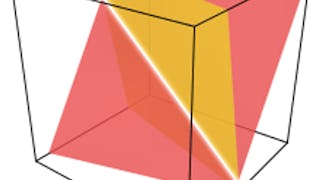- Browse
- Linear Temporal Logic Specifications
Results for "linear+temporal+logic+specifications"
- Status: NewNewStatus: Free TrialFree TrialU
University of Colorado Boulder
Skills you'll gain: Computational Logic, Systems Design, Verification And Validation, Systems Analysis, Software Systems, Theoretical Computer Science, Computational Thinking, System Design and Implementation, Simulations, Programming Principles, Software Architecture, Software Design, Model Evaluation, Graph Theory, Software Testing, Hardware Architecture, Software Quality Assurance, Computer Architecture, Algorithms, Logical Reasoning
4.7·Rating, 4.7 out of 5 stars10 reviewsBeginner · Specialization · 1 - 3 Months
 Status: NewNewStatus: PreviewPreview
Status: NewNewStatus: PreviewPreviewSkills you'll gain: Hardware Design, Field-Programmable Gate Array (FPGA), Data Structures, Systems Design, Application Specific Integrated Circuits, Electronic Systems, Computer Engineering, Verification And Validation, Embedded Systems, Software Design, Simulation and Simulation Software, Test Engineering, Scalability, Data Synthesis, Analysis, Design, Process Optimization
Intermediate · Course · 1 - 4 Weeks
 Status: Free TrialFree TrialU
Status: Free TrialFree TrialUUniversity of Colorado Boulder
Skills you'll gain: Field-Programmable Gate Array (FPGA), Hardware Design, Verification And Validation, Electronic Systems, Embedded Systems, Electronics Engineering, Application Specific Integrated Circuits, Electronic Hardware, Electronics, Systems Design, Software Design, Program Development, Integrated Development Environments, System Design and Implementation, Computer Architecture, Eclipse (Software), Computational Logic, Hardware Architecture, Software Development, Computer Engineering
Build toward a degree
4.5·Rating, 4.5 out of 5 stars1.7K reviewsIntermediate · Specialization · 3 - 6 Months
 Status: Free TrialFree TrialJ
Status: Free TrialFree TrialJJohns Hopkins University
Skills you'll gain: Linear Algebra, Algebra, Applied Mathematics, Advanced Mathematics, Artificial Intelligence and Machine Learning (AI/ML), Mathematical Modeling, Engineering Analysis, Mathematical Theory & Analysis, Numerical Analysis, Geometry, Data Transformation, Applied Machine Learning, Dimensionality Reduction, Markov Model, Probability
4.7·Rating, 4.7 out of 5 stars223 reviewsBeginner · Specialization · 3 - 6 Months
 Status: Free TrialFree Trial
Status: Free TrialFree TrialSkills you'll gain: Field-Programmable Gate Array (FPGA), Electronic Systems, Hardware Design, Application Specific Integrated Circuits, Electronics Engineering, Serial Peripheral Interface, Computational Logic, Electrical Engineering, Computer Architecture, Schematic Diagrams, Semiconductors, Electronic Hardware, Electronics, Electronic Components, Internet Of Things, Embedded Systems, Theoretical Computer Science, Electrical and Computer Engineering, Diagram Design, Programmable Logic Controllers
4.5·Rating, 4.5 out of 5 stars169 reviewsIntermediate · Specialization · 3 - 6 Months
 Status: Free TrialFree TrialB
Status: Free TrialFree TrialBBoard Infinity
Skills you'll gain: Problem Solving, Vocabulary, Logical Reasoning, Critical Thinking, Deductive Reasoning, Arithmetic, Data Literacy, Analytical Skills, Complex Problem Solving, Grammar, English Language, Data Analysis, Learning Strategies, Trend Analysis, Applied Mathematics, Data Presentation, Verbal Communication Skills, Analysis, Quantitative Research, Estimation
3.4·Rating, 3.4 out of 5 stars11 reviewsBeginner · Specialization · 3 - 6 Months
What brings you to Coursera today?
 Status: Free TrialFree Trial
Status: Free TrialFree TrialSkills you'll gain: Field-Programmable Gate Array (FPGA), Application Specific Integrated Circuits, Computational Logic, Computer Architecture, Hardware Design, Electronic Hardware, Electronics Engineering, Electronics, Theoretical Computer Science, Programmable Logic Controllers, Microarchitecture, Electronic Systems, Semiconductors, Electronic Components, Data Storage, Data Storage Technologies
4.5·Rating, 4.5 out of 5 stars126 reviewsIntermediate · Course · 1 - 4 Weeks
 Status: Free TrialFree TrialU
Status: Free TrialFree TrialUUniversity of Colorado Boulder
Skills you'll gain: Real-Time Operating Systems, Embedded Systems, Reliability, Software Systems, Performance Tuning, Embedded Software, Control Systems, Hardware Architecture, Systems Architecture, Software Design, Debugging, Software Architecture, Verification And Validation, Hardware Design, System Design and Implementation, Linux, System Programming, Code Review, Systems Engineering, Real Time Data
Build toward a degree
4·Rating, 4 out of 5 stars122 reviewsIntermediate · Specialization · 3 - 6 Months
 Status: Free TrialFree TrialU
Status: Free TrialFree TrialUUniversity of Colorado Boulder
Skills you'll gain: Verification And Validation, Systems Design, Software Design, Computational Logic, Computer Engineering, Embedded Systems, Hardware Architecture, Simulations, Test Automation
4.4·Rating, 4.4 out of 5 stars625 reviewsIntermediate · Course · 1 - 4 Weeks
 Status: NewNewStatus: Free TrialFree Trial
Status: NewNewStatus: Free TrialFree TrialSkills you'll gain: Retrieval-Augmented Generation, Prompt Engineering, Multimodal Prompts, Prompt Patterns, Prompt Engineering Tools, LLM Application, Model Evaluation, LangChain, Large Language Modeling, Hugging Face, Transfer Learning, Model Deployment, Responsible AI, Performance Tuning, AI Workflows, Generative AI, LangGraph, Embeddings, Context Management, Vector Databases
Intermediate · Specialization · 3 - 6 Months
 Status: Free TrialFree Trial
Status: Free TrialFree TrialSkills you'll gain: Hugging Face, Prompt Engineering, Retrieval-Augmented Generation, LLM Application, Model Evaluation, Responsible AI, Large Language Modeling, Model Deployment, Generative AI, Generative Adversarial Networks (GANs), Application Deployment, Application Development, Technical Management, OpenAI API, Data Ethics, AI Enablement, Trend Analysis, Real Time Data, Business Strategy, Python Programming
4·Rating, 4 out of 5 stars71 reviewsIntermediate · Specialization · 1 - 3 Months
 Status: Free TrialFree TrialU
Status: Free TrialFree TrialUUniversity of Colorado Boulder
Skills you'll gain: Computational Logic, Mathematical Modeling, System Requirements, Functional Requirement, Theoretical Computer Science, Verification And Validation, Control Systems, Network Model, Systems Analysis, Automation, Mechanical Engineering, Real-Time Operating Systems, Agentic systems, Differential Equations, Safety Assurance, Robotics, Artificial Intelligence, Linear Algebra, Algorithms, Applied Mathematics
Build toward a degree
3.6·Rating, 3.6 out of 5 stars34 reviewsIntermediate · Specialization · 3 - 6 Months
In summary, here are 10 of our most popular linear+temporal+logic+specifications courses
- Fundamentals of Model Checking: University of Colorado Boulder
- SystemVerilog Tutorials: Hardware Design & Verification: Coursera
- FPGA Design for Embedded Systems: University of Colorado Boulder
- Linear Algebra from Elementary to Advanced: Johns Hopkins University
- Chip based VLSI design for Industrial Applications: L&T EduTech
- Job & Exam Aptitude Mastery: Reasoning | DI | Verbal | Quant: Board Infinity
- Fundamentals of Digital Design for VLSI Chip Design: L&T EduTech
- Real-Time Embedded Systems: University of Colorado Boulder
- Hardware Description Languages for FPGA Design: University of Colorado Boulder
- LLM Engineering: Prompting, Fine-Tuning, Optimization & RAG: Edureka











